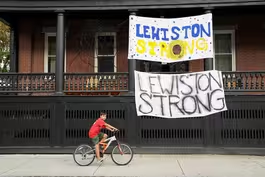
Report finds Philips hid its CPAP machines’ safety issues
Clip: 10/28/2023 | 6m 2sVideo has Closed Captions
Investigation finds Philips hid safety issues with its CPAP machines for years
CPAP machines help about 8 million Americans with sleep-related breathing disorders, like sleep apnea, by keeping their airways open while they sleep. But one manufacturer, Philips Respironics, is coming under fire for a critical change it made to millions of its breathing machines. Michael Sallah, a reporter and investigations editor at the Pittsburgh Post-Gazette, joins Ali Rogin to discuss.
Problems playing video? | Closed Captioning Feedback
Problems playing video? | Closed Captioning Feedback
Major corporate funding for the PBS News Hour is provided by BDO, BNSF, Consumer Cellular, American Cruise Lines, and Raymond James. Funding for the PBS NewsHour Weekend is provided by...

Report finds Philips hid its CPAP machines’ safety issues
Clip: 10/28/2023 | 6m 2sVideo has Closed Captions
CPAP machines help about 8 million Americans with sleep-related breathing disorders, like sleep apnea, by keeping their airways open while they sleep. But one manufacturer, Philips Respironics, is coming under fire for a critical change it made to millions of its breathing machines. Michael Sallah, a reporter and investigations editor at the Pittsburgh Post-Gazette, joins Ali Rogin to discuss.
Problems playing video? | Closed Captioning Feedback
How to Watch PBS News Hour
PBS News Hour is available to stream on pbs.org and the free PBS App, available on iPhone, Apple TV, Android TV, Android smartphones, Amazon Fire TV, Amazon Fire Tablet, Roku, Samsung Smart TV, and Vizio.
Providing Support for PBS.org
Learn Moreabout PBS online sponsorshipJOHN YANG: CPAP stands for continuous positive airway pressure.
And that's what CPAP machines used to help about 8 million Americans with sleep related breathing disorders like sleep apnea, keep their airways open while they sleep.
But as Ali Rogin tells us one company that makes the devices is coming under fire for a critical change it made to millions of its breathing machines.
ALI ROGIN: It started with an irritating rattling noise more than a decade ago keeping people up at night.
Soon after the medical supply company Philips Respironics made a decision to redesign its top selling breathing machines, including CPAP, machines and ventilators.
The company packed industrial foam into the machines to help stop the noise.
But Philips quickly started getting reports from users of the machines complaining of black particles, or dirt and dust showing up inside the devices.
A joint investigation published last month from the Pittsburgh Post-Gazette and ProPublica found that for more than a decade, Philips withheld over 3,700 complaints about these machines from the Food and Drug Administration.
The devices were eventually recalled in 2021.
But a number of users develop new illnesses, including cancer and asthma.
Michael Sallah is a reporter and investigations editor at the Pittsburgh Post-Gazette, thank you so much for joining us.
How did you begin this investigation?
MICHAEL SALLAH, Pittsburgh Post-Gazette: You know, it's like anything the all of this started with us?
Yeah, somebody says, Look, you might want to look in federal court.
There are people slowly filing lawsuits, death cases, cancer, respiratory ailments, kidney failures.
And we did we started looking at the first of all the complaints, but then digging deeper and looking at the records.
And in the course of time, they developed these machines that people were getting sick and in some cases, their loved one say they died as a result.
ALI ROGIN: We recently spoke with somebody who used one of these machines.
His name is Mark Edwards, and he recently joined a lawsuit against Philips.
And I want to play you some sound from what he said about his experience.
MARK EDWARDS: I noticed when I was first using my new machine what we saw like black specks, white specks, it just went from like pure, distilled water to look and like water you would see in like a polluted Creek.
The walls on my lungs are shot now.
So they'll never work again.
I can't get a lung transplant because nobody will be wanting transplanting your lung into a infected area where it's just going to go bad.
ALI ROGIN: Michael, does that track with the story you heard from others?
MICHAEL SALLAH: Yeah, it starts with all those debris and the contamination inside these devices.
You have to understand Ali.
These are devices that are supposed to deliver clean air to people with already compromised conditions.
And then all of a sudden now they're getting volatile organic compounds, formaldehyde-phenol in particulate matter and in fumes in their breathing acidic night, so there's hours at a time.
ALI ROGIN: What was known about the compounds that make up this foam prior to them adding it to this machine.
I mean, it's used in other products, right?
MICHAEL SALLAH: Yeah, that's used in pillows and mattresses and sofas.
They used the wrong foam.
They used to foam to basically reduce the sound, you know, these can get very loud at night, people were trying to sleep.
So they put it in this foam to help reduce the vibrations and the noise.
But unfortunately, a phone breaks down under a process called hydrolysis, heat and moisture.
And it gives off these little black particles.
It also fumes into the mask.
So sleeping patients.
ALI ROGIN: What did Philips know about the dangers of these machines?
And when did they know it?
MICHAEL SALLAH: Well, we know this, the first few complaints started coming in to Philips around 2011, 2010.
That was just a year or two after they started inserting the phone in all their models, both the ventilators and the CPAPs.
So they're already getting the complaints coming in by 2015.
We have emails between Philips engineers and the foam suppliers saying he wouldn't give here we have potentially a health problem.
It still didn't stop them from making the machines.
In fact, during COVID they went into overdrive, advertising and aggressively marketing these it health fairs from Vegas to Dubai.
ALI ROGIN: It's stunning.
How did they get away with this for so long?
MICHAEL SALLAH: This is a great question.
We believe that the FDA was also getting some of the complaints even though Philips held back most of them.
Some are actually reaching the regulatory agency.
They still have not taken any disciplinary actions or penalties against the company.
There is a Department of Justice investigation.
It is criminal in nature.
And the subpoenas have been going out for months now.
ALI ROGIN: And what is the status?
Where does that DOJ investigation stand?
I also know that families across the country are suing Phillips in federal court in western Pennsylvania there are more than 700 plaintiffs and thousands of more who have filed claims.
What are the status of those procedures as well?
MICHAEL SALLAH: There still ongoing.
Those will be winding through the courts for a while there was a big settlement on the economic damages.
So the company agreed to pay $479 million last month to pay people for buying the defective machines.
But the other big cases, the bigger ones are still pending.
This is going to be another one of those where this will be tracked and evaluated for years to come.
For people that were on these machines for years.
ALI ROGIN: Michael Sallah with the Pittsburgh Post-Gazette, thank you so much for breaking this down for us.
MICHAEL SALLAH: Glad to be here.
Thanks.
American family trapped in Gaza struggles to escape the war
Video has Closed Captions
Clip: 10/28/2023 | 5m 38s | American family trapped in Gaza struggles to escape the war (5m 38s)
Israel assaults Gaza by land, air and sea as raids escalate
Video has Closed Captions
Clip: 10/28/2023 | 5m 9s | Israel assaults Gaza by land, air and sea on 2nd day of escalated raids (5m 9s)
Relief, mourning in Maine after shooting suspect found dead
Video has Closed Captions
Clip: 10/28/2023 | 4m 52s | Relief and mourning in Lewiston after suspected mass killer found dead (4m 52s)
Providing Support for PBS.org
Learn Moreabout PBS online sponsorship
- News and Public Affairs

FRONTLINE is investigative journalism that questions, explains and changes our world.

- News and Public Affairs

Amanpour and Company features conversations with leaders and decision makers.












Support for PBS provided by:
Major corporate funding for the PBS News Hour is provided by BDO, BNSF, Consumer Cellular, American Cruise Lines, and Raymond James. Funding for the PBS NewsHour Weekend is provided by...



